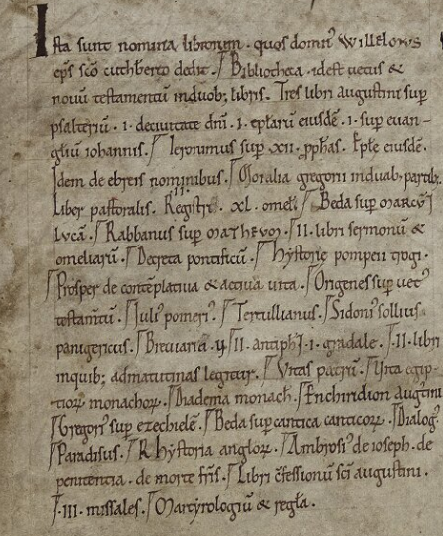On the front of the first folio of the Bible of William St Calais (Durham Cathedral Library MS A.II.4), Symeon of Durham (identified by his writing; d. c. 1130) gives a list of books donated by William of St Calais (Bishop of Durham, 1080-1096):

Bishop William donated 49 volumes listed here: a two-volume Bible; three volumes of St Augustine’s Commentary on the Psalms; St Augustine’s On the City of God; a volume of St Augustine’s letters; St Augustine’s commentary on the Gospel of John; St Jerome on the Twelve Minor Prophets; a volume of St Jerome’s letters; St Jerome on Hebrew words; St Gregory the Great’s Moralia in two volumes; St Gregory’s Liber Pastoralis; the Register of St Gregory’s letters; the 40 Gospel Homilies of St Gregory; Bede’s commentary on Mark and Luke; Hrabanus Maurus on the Gospel of Matthew; two books of sermons and homelies; ‘decrees of the pontiffs’ (this is the canon law collection Collectio Lanfranci; the Histories of Pompeius Trogus (almost certainly the epitome by Justin); Prosper On the Contemplative and Active Life; Origen on the Old Testament; Julius Pomerius (which should read Julianus Pomerius) On the Contemplative Life; Tertullian; Sidonius Apollinaris’ poems (‘Panigericus); two volumes of the Breviary; two volumes of antiphoner; one graduale; two books of readings for Matins; ‘Lives of the Fathers’; Life of the Egyptian Monks; Diadema Monachorum; the Enchiridion of St Augustine; St Gregory the Great on Ezekiel; Bede on the Song of Songs; Dialogus; Paradisus; a Hystoria Anglorum, presumably that of Bede; St Ambrose of Milan On Joseph, On Penitence, and On the Death of His Brother; ‘Books’ of the Confessions of St Augustine; three missals; and a martyrology and the rule (one volume).
A great many of these manuscripts still exist here at Durham, which is exciting. The Collectio Lanfranci has made its way to Cambridge as Peterhouse MS 74. My colleague Elizabeth is hunting down any others that may be traceable.
Almost half of these are patristic — unless you want to make Bede a church father, then over half. The remaining books are the Bible, liturgical books, books about the monastic and contemplative life, and Pompeius Trogus (or, rather, Justin’s epitome of Trogus); this last is useful for the reader of the Bible to gain historical context.
William of St Calais refounded the religious house associated with Durham Cathedral as a Benedictine priory in 1083. These books reflect the Benedictine world of prayer, Scripture reading, and ascetic/contemplative labour.
Thus, the patristic texts are mostly biblical commentaries or writings about the ascetic and contemplative lives — this latter category will include many of the letters of St Jerome. The other early mediaeval works, such as the Diadema Monachorum (presumably of Smaragdus, d. 840) or Hrabanus Maurus on Matthew, are of the same nature. There are also Late Antique or early medieval saints’ lives here, the Vitas Patrum, the Dialogus, the Paradysus, and the Vita Egiptiorum monachorum — the edifying stories of the early Egyptian and Italian monks.These together inform how monks read the Bible, pray the liturgy, pray silently in their cells, work in their gardens.
In fact, important for understanding the solitary community that is a monastery, we need to take note of Gregory the Great, Prosper, and Julianus Pomerius. All of these writers, like most late ancient Christian writers, hold the contemplative (or ‘mystical’) life in the highest regard, but they also believe in the active life of service and charity, navigating a way to hold them both in tension. This is precisely what someone living under Benedict’s Rule needs to grasp.
This balance is the soul of monasticism when taken alongside the liturgical life of the monastery — and for this William has also provided abundantly.
Everything a monk needs? Probably.
